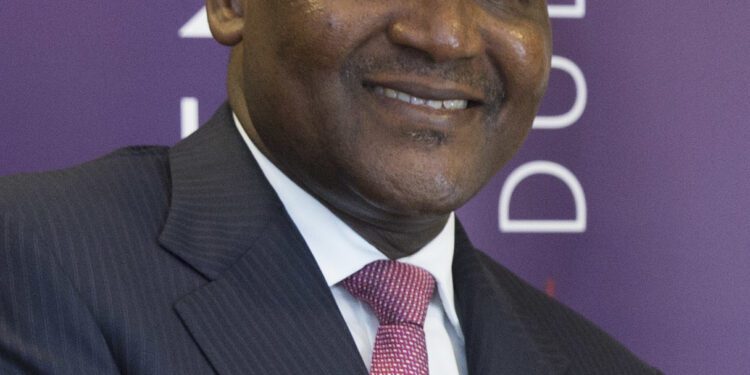It is not happenstance that Aliko Dangote, was named the richest man in Africa in 2021, for the tenth time in a row, with an estimated net worth of $12.1 billion.
The business empire he began to build more than three decades ago, Dangote Group, is inching closer to realising its vision to be the number one conglomerate in sub-Saharan Africa today. It has emerged one of the largest private-sector employers in Nigeria as well as the most valuable conglomerate in West Africa.
Born in 1957, Dangote grew up in an entrepreneurial household in Kano State, Nigeria. He was raised a Muslim and lived an upper-class life. Dangote’s grandfather, Sanusi Dantata, was once named one of the wealthiest people living in Kano. He made his fortune selling commodities like oats and rice. Dantata became Dangote’s guardian in 1965 after the death of his father.
The truth is, Aliko Dangote’s journey to fortune is not a rags-to-riches story. He came from a wealthy family that was able to provide the financial assistance he needed to start his business. Over the years, Dangote has expanded into new business segments, including telecommunications, real estate, and steel manufacturing.
It is the robust structure painstakingly built by Aliko Dangote, himself that has yielded to the huge successes recorded by the Dangote Group.
Shortly after graduating from college at 21, Dangote borrowed $3,000 from his uncle to import and sell agricultural commodities in Nigeria, his native country. His business venture quickly became a success, and as a result, he managed to repay the entire loan within three months of starting operations. Ultimately, Dangote was able to turn a local commodities trading business into a multibillion-dollar corporation. Although the idea of floating Dangote Group, admittedly, was conceived by him, his creativity and innovativeness was brought to bear in making Dangote one of Nigeria’s fast-growing brands in the World today.
Dangote’s business interests encompass many industries, including oil and gas, consumer goods, and manufacturing. However, Dangote Cement makes up the majority of the conglomerate’s revenue, of which Dangote owns 85%. According to Forbes magazine, the subsidiary produces 45.6 million metric tons of cement every year and operates in 10 African countries.
Dangote also owns the world’s third-largest sugar refinery. As of March 31, 2021, Dangote Cement Group reported quarterly revenue of 332.7 billion Nigerian nairas, approximately US$808.5 million.
Though Dangote has also not stopped counting himself lucky for having supportive staff members, he is said to make his fortune by importing and selling agricultural commodities, and later through oil and gas, consumer goods, and manufacturing. The majority of Dangote’s fortune comes from Dangote Cement, which produces 45.6 million metric tons of cement every year and operates in African countries.
Dangote Cement, a segment of his conglomerate, is on course to approach the capital market to raise new debt through bonds after its board agreed to the move, aimed at financing its operations and some expansion projects, Nigeria’s second biggest company by market capitalization said Wednesday.
The cement giant said it would first observe market conditions closely to know the right time for entry even though it assured the bonds will be issued soon.
“The Company had submitted an application to the Securities and Exchange Commission in respect of the bonds, and relevant approvals have now been received,” Dangote Cement said in a regulatory filing.
Last May, the firm issued N50 billion Series 1 Fixed Rate Senior Unsecured Notes with varying coupon rates of 11.25, 12.50 and 13.50 per cent for the three, five and seven year tranches in that order under its N300 billion multi-instrument debt issuance programme.
The capital was planned to facilitate Dangote Cement’s export strategy across Africa, where it operates in 10 markets.
According to researchers, the rise of Dangote Cement plc to become the dominant player in the Nigerian cement industry, could probably be traced to the close relationship between the company’s founder, Aliko Dangote, and subsequent Nigerian governments. An important factor in this success story, however, it is not the only explanatory variable.
Dangote’s entrepreneurial skills and understanding of the Nigerian political and economic environment enabled him to proactively predict and explore the rapid increase in demand for cement in the country. The reluctance of most multinational cement companies to increase their investments in Nigeria, a consequence of the ever increasing international scrutiny of business ethics, especially in corruption prone countries also helped reduce the competition and investment risks for Dangote Cement.
Aliko Dangote, the founder of Dangote Cement, came to international attention in 2008 when, with an estimated fortune of $3.3 billion, Forbes magazine named him the richest person in Nigeria. By 2011, his net worth had risen to $13.8 billion, making him the richest person in Africa. In 2014, with a total net worth of US$ 25 billion, the equivalent to 5 percent of recently rebased Nigeria’s GDP, he became the twenty-third richest person in the world. Dangote is now the richest black person ever.
Underpinning his personal wealth are investments in the Dangote Group of companies, which currently have interests spanning a range of industries, including: cement, sugar, salt, pasta, beverages, steel, fertilizer, oil and gas, Polypropylene products, haulage, and packaging. Dangote Cement, which is the biggest company quoted on the Nigerian Stock Exchange, accounts for over 90 percent of Aliko Dangote’s personal wealth.”
Commendable is Aliko Dangote’s huge economic patriotism and commitment to the socio-economic development of our country as well as the well-being of the people.
Olamide Adeniji is a member of the editorial team of TheScript Newspaper




